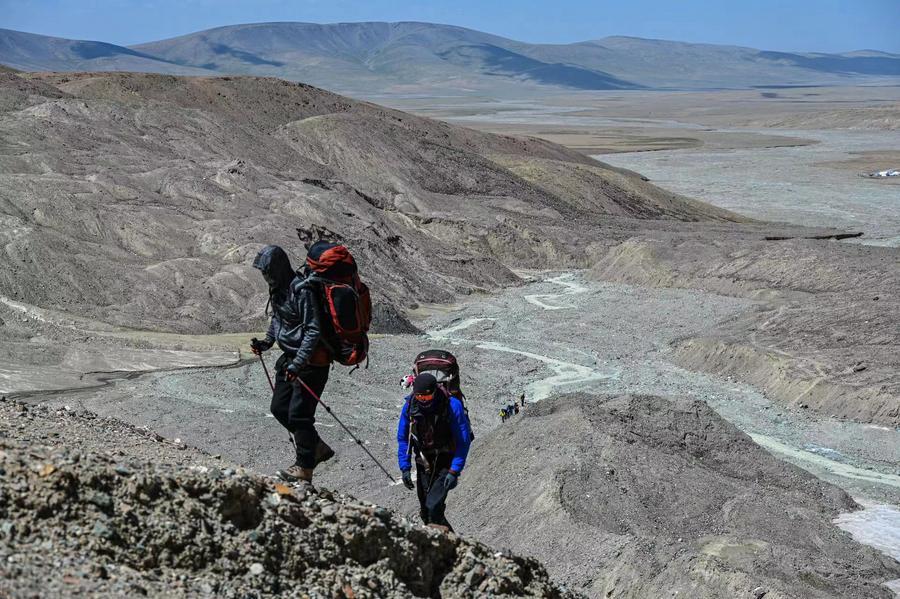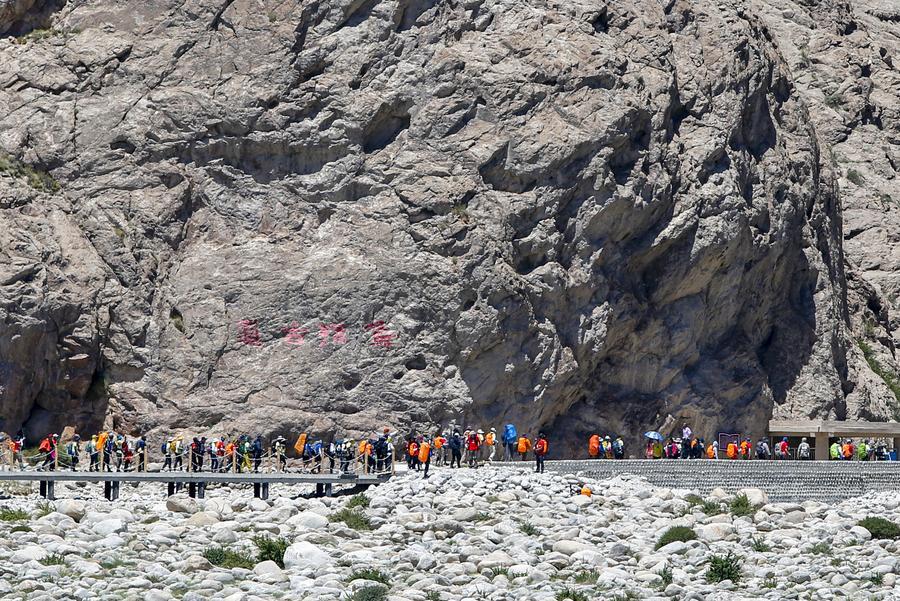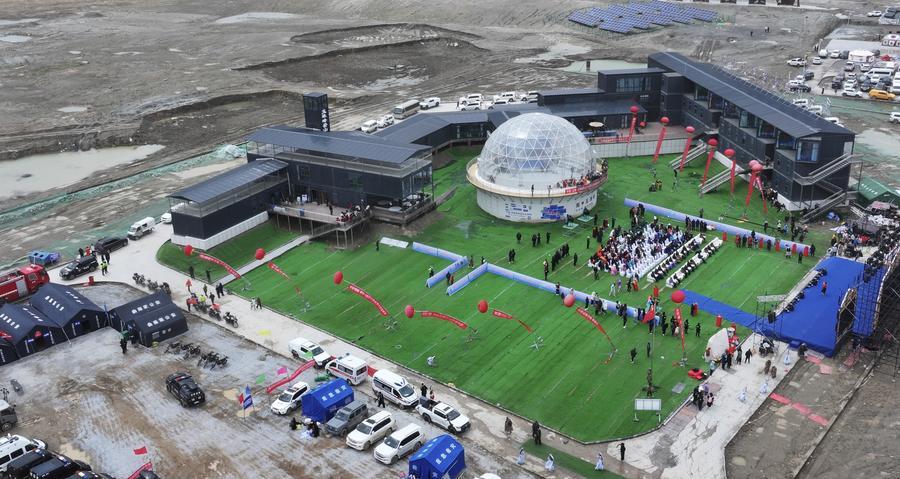Thriving mountaineering unlocks economic potential of China's remote area
XINING, Aug. 26 (Xinhua) -- It is still early autumn in Qumalai County, Qinghai Province, but the snowflakes have started falling gently, nestling deep within the bosom of the Sanjiangyuan area, where the Yangtze, Yellow and Lancang rivers originate.
Towering 6,178 meters above sea level and crowning the eastern ridge of the majestic Kunlun Mountains, Yuzhu Peak draws mountaineering enthusiasts from all over the world, including quite a few novices.

Cedin (1st R) and team members climb Yuzhu Peak in Qumalai County of Yushu Tibetan Autonomous Prefecture in northwest China's Qinghai Province, Aug. 16, 2024. (Xinhua)
A native of Ngangla Village, Cedin, 24, is among the local residents guiding visitors on their trips up and down the mountain. He embarked on his new profession last July, marking a clear departure from his family's nomadic traditions.
Yuzhu Peak stands at the junction of Qumalai County in the Yushu Tibetan Autonomous Prefecture and the city of Golmud in the Haixi Mongolian and Tibetan Autonomous Prefecture of Qinghai, northwest China. With its approachable altitude and awe-inspiring vistas, it offers a gentle yet thrilling introduction to high-altitude exploration. In recent years, it has emerged as a favored spot for those who are new to the art of mountaineering.
The local community from which Cedin comes has relied on the tough nomadic lifestyle for generations. However, the growth of high-altitude mountain climbing in the area has brought about a new source of income and a new identity to go with it.
OUTDOOR SPORTS CRAZE
Each year, the months of May through October herald the prime season for mountaineering. As a seasoned guide, Cedin leads groups of climbers on a journey that includes a day of acclimation to the high-altitude climate at Xidatan Township in Haixi. From there, they ascend to the Yuzhu Peak base camp, nestled at an elevation of 5,050 meters. It is at this camp that Cedin imparts foundational mountaineering know-how to novice climbers.
After a couple of days of training and acclimatization at the base camp, climbers venture onward, passing through the C1 camp situated at a daunting 5,600 meters. With the preparations taken care of, they make their final determined push to conquer the summit of Yuzhu Peak.
"This is a challenging profession where we must constantly update our knowledge of professional mountaineering techniques," explained Tashi Dorje, another guide. "Throughout the climb, we also need to maintain good communication with climbers, encouraging them to overcome both the physical and mental challenges of scaling the snowy peaks."
Cedin mainly offers private guiding, either one-on-one or with a pair of climbers. Over the course of a week, he can earn nearly 4,000 yuan (about 560 U.S. dollars), a testament to the burgeoning mountaineering industry that has brought new hope to the youth of his village.
"The idea of earning a living by guiding others to the peaks never crossed my mind before. Now, we have the opportunity to enjoy a good income right here at home," he said.
Behind Cedin's shifting life course is a thriving outdoor sports industry in China.

Hiking enthusiasts go for a hike on the Wusun ancient road in Baicheng County, northwest China's Xinjiang Uygur Autonomous Region, June 9, 2024. (Xinhua/Chen Shuo)
As the economy flourishes, it ushers in profound changes in the way people live. According to Qian Junwei with the Department of Physical Education, Peking University, the innate human desire to reconnect with nature and the growing appreciation for a healthy lifestyle have ignited a passion among the Chinese populace to venture into the great outdoors.
The China Outdoor Sports Industry Development Report (2022-2023) revealed a 79 percent increase in outdoor sports-related orders in the first half of 2023 compared to the same period in 2022, and a surge of 221 percent compared to 2019.
The Action Plan to Promote the Construction of Outdoor Sports Facilities and Service Enhancement (2023-2025), released in October 2023 by the National Development and Reform Commission together with the General Administration of Sport and other departments, set a target of 3 trillion yuan for the outdoor industry by 2025.
Outdoor sports typically take advantage of natural resources and are closely linked to the national strategy of rural revitalization, said Li Yuan, head of the School of Physical Education, China University of Geosciences.
These activities represent an interaction between people and the natural environment, and the best natural resources are often found in rural and remote areas, said Li, adding that the growing interest in outdoor sports will spur the development of sports, cultural tourism, and other resources, enhancing local infrastructure and boosting the development of related industry chains.
These days, many of the 1,286 residents in Ngangla Village are engaged in mountaineering-related jobs, with 20 working as mountaineering guides like Cedin. In 2023 alone, the village's income from the mountaineering industry was nearly 1.2 million yuan.

A drone photo taken on Aug. 8, 2024 shows the Yuzhu Peak mountaineering resort in Qumalai County of Yushu Tibetan Autonomous Prefecture in northwest China's Qinghai Province. (Photo by Ang Jiang/Xinhua)
On Aug. 8, an international mountaineering tourism project was launched in Ngangla Village. With a total investment of 34 million yuan and covering an area of 2.3 hectares, the tourism complex comprises sports, entertainment, scientific research and study tours.
BALANCING ECONOMY AND ECOLOGY
At dawn on Aug. 11, after six days of adaptive training and climbing, Zheng Guorui, 28, finally stood at the summit of Yuzhu Peak.
"Whenever I felt on the brink of giving up, I would compel myself to persevere," he reflected. "The temperature at the summit was incredibly cold, likely around minus 20 degrees Celsius. This journey not only allowed me to push my limits, but also deepened my reverence for the grandeur of the Sanjiangyuan region."
Zheng, a locomotive driver, was drawn to the high plateau by his love for the snow mountains.
Before the climb, Zheng was told by his guide to prepare a bag for collecting all the garbage he would generate.
All the 19,000 square kilometers of the land area of Qumahe Township, where Ngangla Village is located, fall within the Sanjiangyuan National Park. Ecological conservators from the four villages under the jurisdiction of the township conduct regular garbage-collection activities in the region.

Tashi Dorje (L) and Cedin pose for a photo at the Yuzhu Peak base camp in Qumalai County of Yushu Tibetan Autonomous Prefecture in northwest China's Qinghai Province, Aug. 8, 2024. (Xinhua/Li Linhai)
Now the Yuzhu Peak base camp is like a "global village" where climbers share their passion, dreams and love of nature.
Tsering Tashi, also a native of Ngangla Village, has capitalized on the burgeoning mountaineering industry to establish his own company, crediting climbing with defining his life's journey.
"We must cherish and protect our land, allowing more people to not only climb but also to appreciate the breathtaking beauty of the Sanjiangyuan area," he said.
(Reporting by Ma Yujie, Li Linhai, Li Yao and Deng Ziqi)
